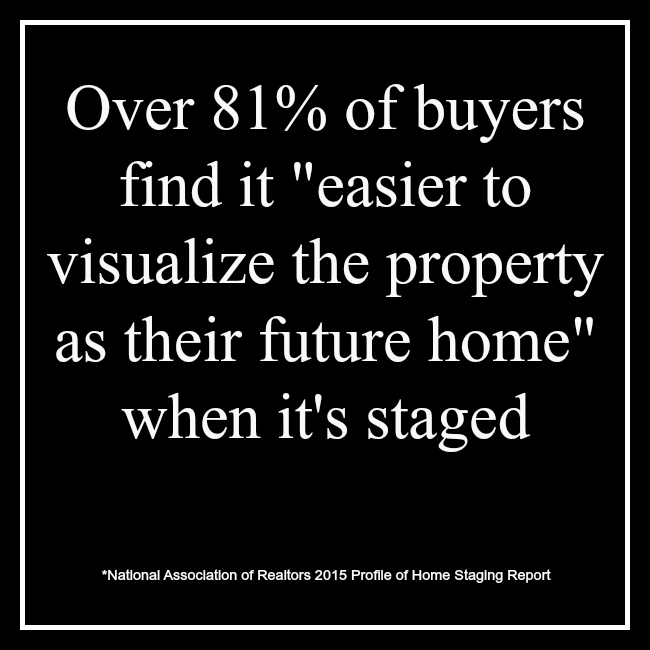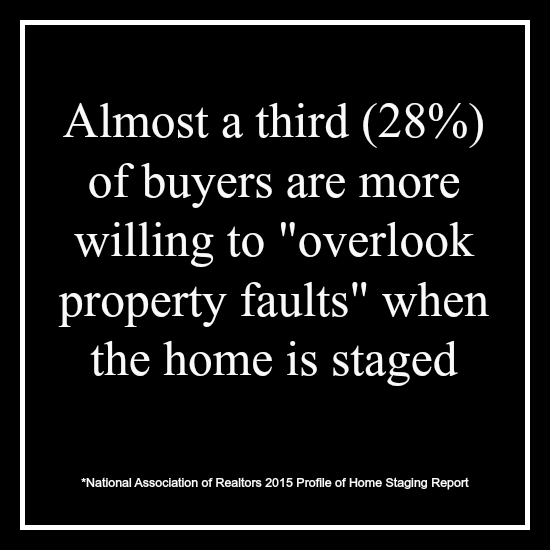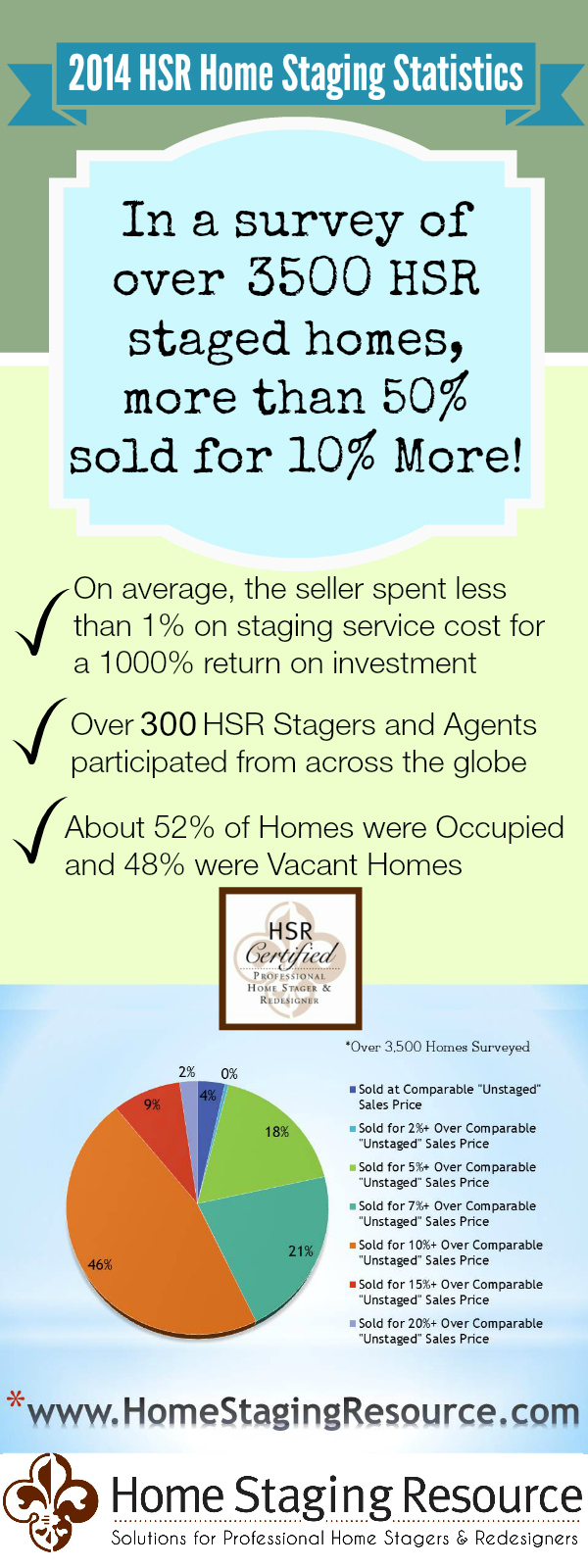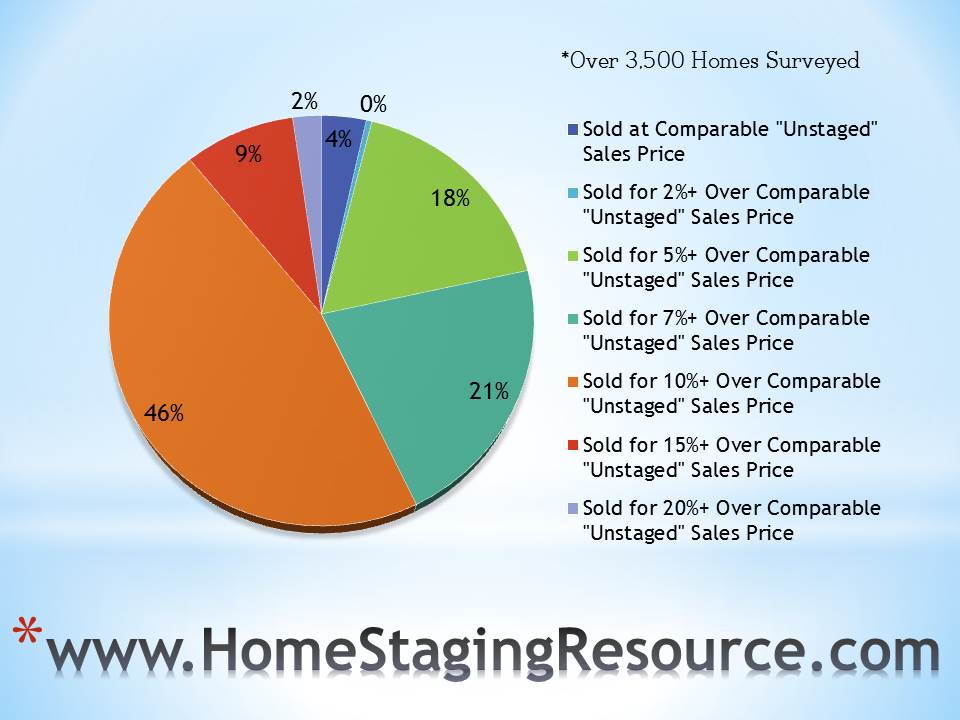Educating Clients
Statistics are a great way to educate sellers and we always blog about the latest statistics on the front of our website, so CLICK HERE to see home staging stats. RESA has been trying to get statistics from members and you can find their latest statistics and reports by CLICKING HERE. I've posted the most relevant statistical images at the bottom of this page.
How to Educate Sellers Video
The Art of Phraseology
I heard the story of a "veteran" stager who immediately walked into the home and exclaimed to the agent they were asking too much for the home. Sure enough, that agent decided to give this new HSR member stager the job over the offending veteran stager.
It's so important that we are careful with our words! We are in a position to really offend someone since it's the equivalent to criticizing someone's child...people are just as emotional about their home.
In the Staging Day Videos, I'm always talking about the correct way to phrase your advice to the seller, so make sure to watch some of those fun MLS critiques.
Below is a video of tons of go-to phrases home stages use, as well as my personal hot tips :
#1
Use Separation Terminology
In our industry we need to approach the home as an expert, yet separate the idea of a "staged home" vs. a "lived home". People can live any way they want in their home but now that they have decided to sell, it is not about their home but their most "valuable commodity." Refrain from using the word "home" in your staging process and use the word "house," "space" or "product" instead. This reminds the seller that it's not personal. Consistently use the words "buyer," "compete" and "marketing" in your process to remind the seller that we are decorating and marketing the product to compete with other homes, so that buyers fall in love!
#2
Use Regular "Benefit" Reminders
Here are two phrases that are critical to use throughout your staging process. "We need to transform each room for a FASTER, MORE PROFITABLE SALE." Always use "we" because selling the home is about teamwork and it involves the agent, seller and stager. By reminding them of the end-goal, it's easier to get through the tough times. Another phrase you should use is, "A staged home is not a lived home, so ..." continue with your criticism. By opening up a criticism with the staged vs. lived preface, it becomes a lot easier to swallow by the owner and separates them from the decorating offense.
#3
Start and End with a Compliment
This really is "Constructive Criticism 101" but works wonderfully when it comes to staging! For instance, when decorating a room you are usually always making a change in order to highlight something positive, so focus on the positive and speak about how those changes will greatly highlight it. For example, "Your fireplace is so beautiful, so we don't want the entertainment center to fight with it for attention." Or, "This room (or home) has so much potential, so we want to clear out the pieces that make it appear smaller." Always speak in terms of the positive, engage the owner in the staging reasons "why" and remind them of the future benefits. "You have a lot of beautiful things! So much so, that a buyer may become distracted and not actually see the architectural details of the home."
#4
Use Gentle Humor
If you can deliver criticism in a light-hearted manner, it will be received in a much more positive way. Humor doesn't diminish the seriousness of the feedback you are giving, it actually helps the person receiving the direction to open up and take it in. For instance, when speaking about a tough issue like wall paper, it's fun to use the phrase, "Wall paper is like bathing suit shopping, you wouldn't want mine and I wouldn't want yours...it's intensely personal!" People invariable laugh and "get it".
#5
Speak Confidently and Be Decisive
After all, you ARE the expert!
Agents need you to be the confident "bad guy" whose job is to market the inside of the house by telling a seller plainly what buyers are looking for, and what they will need to do to attract an offer. Don't be timid or wavering in your suggestions because it betrays a lack of knowledge to the seller. It's okay to change your mind about something to a degree since staging is an ART form but you'll want to remind your seller about this as well.
Be positive, enthusiastic and confident in your natural ability, you cannot hurt the home! Enthusiasm is contagious! If you're not confident that staging works, go to your local MLS and look at the difference between a staged home and the 70% of other homes that aren't staged!
#6
Watch Your Delivery
In the mirror practice constructive criticism. What does the tone of your voice reveal? What about your eye contact? Non-verbal cues are just as important as what is said, so make sure you're not appearing impatient or insensitive by remembering that this is their beloved home that they have lovingly decorated (whether they have good taste or not:)
#7
Take Their Temperature Throughout the Process
It is critical that you "check-in" with your clients throughout the process and ask permission about doing certain things while explaining WHY they are important. Giving your clients an education in staging and design only enhances your appeal and the perception of your expertise. This is why I am not a fan of the "while you were out approach!" I'm a firm believer that setting a correct expectation eliminates future problems, so don't do anything in the non-vacant home without their knowledge and understanding. If you sense nervousness in your client, take a break and get their temperature, “how are you feeling right now?”...usually there is simple solution or compromise that works.
#8
Potential is EVERYTHING!
Always speak in terms of "potential". "The space is good but with a bit more attention will become spectacular!" "Your house has such good bones; it won't take too much to highlight them for buyers."
#9
Don't Harp!
There is nothing worse than a broken record! Once you've stated your criticism, make the change and move on. If you feel more convincing is necessary, use design and staging facts as examples of why i.e. scale, balance or emphasis. If they still don't want to make the change, let it go.
Remember, the seller benefits the MOST from a staged home, not you or the agent! You are being paid to be critical, so remind them that that is your job. We are putting on our "most critical buyer's eyes, so we can make the most money out of your most valuable posession!"
Here are some images I created to display statistics that you can feel free to use (right click and save as...onto your computer).







